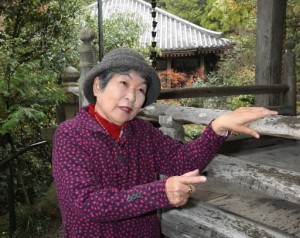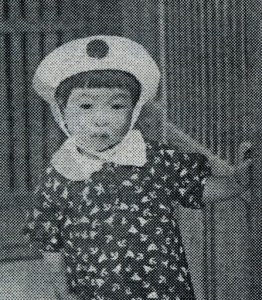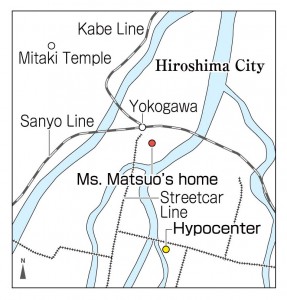Kiyoko Matsuo, 77, Naka Ward, Hiroshima
Dec. 17, 2015
Cried out for her mother all through the night
by Takamasa Kyoren, Staff Writer
“I wondered why I survived the atomic bombing. I wanted to die.” Kiyoko Matsuo (née Nagataki), now 77, lost her mother in the bombing at the age of six and became an orphan. Her days after the atomic bombing were filled with tears. Back then, she was a first-year student at Misasa National School (now Misasa Elementary School in Nishi Ward). She had no siblings and her father, a railroad worker, had died in an accident at work five years before. She was living her mother, Takeno, in Yokogawa-cho (now part of Nishi Ward).
Around 7 a.m. on August 6, 1945, Takeno left home to help with work for the war effort in Dobashi-cho (now part of Naka Ward). Ms. Matsuo went to her friend’s house in her neighborhood and they were playing on the second floor. Suddenly, as she was stripping to the waist because of the hot morning, there was a huge flash and a tremendous roar.
The house collapsed. She managed to escape the house with her friend, but fire began breaking out, here and there. Crying and shouting for her mother, she and the friend fled, following some adults.
Exposed to the black rain that fell in the aftermath of the A-bomb blast, Ms. Matsuo finally arrived at an air raid shelter, crammed with the injured and the dead. While naked and shivering from cold and fear, Ms. Matsuo was comforted by a woman she didn’t know. The woman, who was with her child, told Ms. Matsuo, “Don’t cry. You’ll be all right,” and covered her with a pair of men’s underwear.
She spent that night at Mitaki Temple (now part of Nishi Ward) with her friend. As the victims moaned in pain throughout the night, she watched the city burning in the darkness beyond. That night she cried out, over and over, “Where are you, Mom?”
Three days after the atomic bombing, Ms. Matsuo accidentally came across her grandfather, who had been searching for her and her mother, at a police box in the Nagatsuka district (now part of Asaminami Ward). She then went directly to live at her grandparents’ home (now in Asakita Ward). In the end, she did not reunite with her mother, or even find her remains.
At her grandparents’ house, she lived with cousins who had also lost their parents in the war. She began walking to school with a young cousin on her back.
Because of her exposure to the bomb’s radiation, her hair and eyebrows fell out. Her face was covered with rashes and pus-oozing wounds. Other children in the neighborhood teased her, calling her “Pikadon.” [The Japanese term “pikadon” is a combination of the words for the flash, “pika,” and boom, “don,” of the atomic bomb.] Some children even threw rocks at her. On the bank of the river that flowed near her home, she shed tears every day, saying, “Mom, I want to see you. I want to die.”
A girl who lived nearby, who was a year older, gave her emotional support. When Ms. Matsuo was weeping, the girl was by her side with compassion, before she knew it, and told her, “You’ll be all right.” Ms. Matsuo became absorbed in reading the many books the girl lent her. Lost in the books, she could forget her hardships. Ms. Matsuo is still good friends with this person today.
Though they were poor, her grandparents raised her to be cheerful and strong. After graduating from junior high school, she went to live at a barber shop in Kyobashi-cho (now part of Minami Ward) and earned a barber’s license after attending a school for barbers as she worked. At the age of 22, she married Takayuki Matsuo (who died in June). Back then, there was discrimination against A-bomb survivors because of such prejudices as “A-bomb disease is contagious,” and “A-bomb survivors won’t be able to have children.” That was why both Ms. Matsuo and her husband hid from each other the fact that they were A-bomb survivors.
The couple ran a barber shop and had two daughters and six grandchildren. Ms. Matsuo said, “We must not produce more people who suffer the kinds of hardships we did.” When each of her grandchildren turns 20, she takes them to the A-bomb Dome and shares her account of the atomic bombing. So far, she has recounted her experience to four of her grandchildren. Seeing the somber looks on their faces, she feels the importance of conveying her account to young people.
Teenagers’ Impressions
The precious words “You’ll be all right”
“You’ll be all right.” Ms. Matsuo, who often wept on a riverbank after the war, was touched by these words from a friend. I realized how precious such words from another person can be when you’re suffering. I want to help convey not only the A-bomb accounts, but also the fact that someone’s words can save you when you feel as if your whole world has turned dark. (Yukiho Saito, 13)
Value each encounter with others
Ms. Matsuo lost her mother at the age of six and was orphaned. She hardly ever smiled as a child. But after leaving her grandparents’ home, she gradually began to change because of the people she met. I saw her smile during our interview. I want to convey the A-bomb survivors’ feelings to other people, and that we should value each encounter with others. (Shunichi Kamichoja, 15)
Losing her mother in the atomic bombing
Ms. Matsuo lost her parents and was raised by her grandparents. She lost her mother in the atomic bombing and felt discrimination at school so she was very sad and went on weeping on a nearby riverbank. If I had to live without my parents as an elementary school student, I couldn’t stand it. The atomic bomb, which deprived small children of their parents, must never be used again and war must never be waged. (Kana Fukushima, 17)
(Originally published on December 7, 2015)










